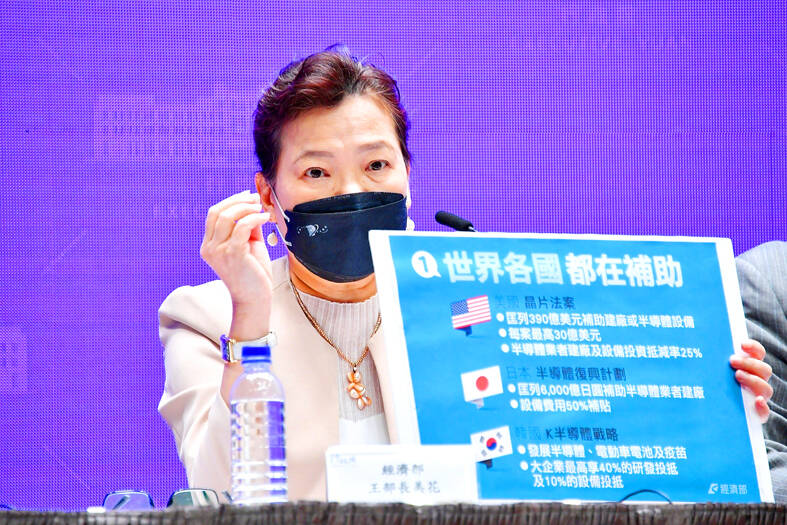The Cabinet yesterday approved a bill proposing larger tax breaks on the research and development (R&D) expenditures of private businesses.
The draft amendment to the Statute for Industrial Innovation (產業創新條例) proposes a 25 percent tax deduction on eligible companies’ R&D costs, up from 15 percent.
It also proposes a tax break of 5 percent on equipment procurement spending, granted that the total deductions do not exceed 50 percent of a firm’s overall income taxes.

Photo courtesy of the Executive Yuan
The draft is to be sent to the Legislative Yuan for review.
The proposed tax break would apply to companies across all sectors, granted they meet the threshold for effective tax rate, and R&D expenditure and intensity.
The effective tax rate threshold would initially be 12 percent and would be raised to 15 percent by 2024, but companies could seek Cabinet approval to defer the increase to 2025, the bill says.
The bill did not specify a minimum R&D expenditure to qualify for the tax break.
An official told the Central News Agency on condition of anonymity that the amount is expected to be at least NT$5 billion (US$60.5 million) annually.
Minister of Economic Affairs Wang Mei-hua (王美花) said the proposed tax break would not only cover semiconductor manufacturers as reported by the media, but also companies in the electric vehicle, 5G and low-Earth-orbit satellite sectors, among others.
Foreign companies and their subsidiaries that engage in R&D in Taiwan would also be eligible for tax deductions, as they contribute to Taiwan’s industrial development, she said.
The bill would result in lost tax revenue for the government, Wang said, but that the tax break’s benefits outweigh its costs.
Local semiconductor companies, including Taiwan Semiconductor Manufacturing Co (台積電) and United Microelectronics Corp (聯電), voiced their support for the proposed tax break.
ASE Technology Holding Co (日月光投控) chief operating officer Tien Wu (吳田玉) said the chip testing and packaging company welcomed the government’s proposal to revise the tax rules in accordance with the evolution of key industries.
The revision would help bolster semiconductor companies’ R&D capabilities and allow them to keep their competitive edge in the long term, Wu said.
Semiconductor firms are to face greater challenges over the next decade, as competition has intensified after several governments launched subsidies to bolster their own semiconductor sectors, ASE said.
Handset chip designer MediaTek Inc (聯發科) said the tax break would encourage local semiconductor companies to increase R&D investment, which would enhance their competitiveness and boost Taiwan’s semiconductor output.
“With the government’s help, Taiwan’s semiconductor industry will further cement its position in the global semiconductor supply chains,” SEMI Taiwan president Terry Tsao (曹世綸) said in a statement.
Additional reporting by Lisa Wang

WAITING GAME: The US has so far only offered a ‘best rate tariff,’ which officials assume is about 15 percent, the same as Japan, a person familiar with the matter said Taiwan and the US have completed “technical consultations” regarding tariffs and a finalized rate is expected to be released soon, Executive Yuan spokeswoman Michelle Lee (李慧芝) told a news conference yesterday, as a 90-day pause on US President Donald Trump’s “reciprocal” tariffs is set to expire today. The two countries have reached a “certain degree of consensus” on issues such as tariffs, nontariff trade barriers, trade facilitation, supply chain resilience and economic security, Lee said. They also discussed opportunities for cooperation, investment and procurement, she said. A joint statement is still being negotiated and would be released once the US government has made

NEW GEAR: On top of the new Tien Kung IV air defense missiles, the military is expected to place orders for a new combat vehicle next year for delivery in 2028 Mass production of Tien Kung IV (Sky Bow IV) missiles is expected to start next year, with plans to order 122 pods, the Ministry of National Defense’s (MND) latest list of regulated military material showed. The document said that the armed forces would obtain 46 pods of the air defense missiles next year and 76 pods the year after that. The Tien Kung IV is designed to intercept cruise missiles and ballistic missiles to an altitude of 70km, compared with the 60km maximum altitude achieved by the Missile Segment Enhancement variant of PAC-3 systems. A defense source said yesterday that the number of

Taiwanese exports to the US are to be subject to a 20 percent tariff starting on Thursday next week, according to an executive order signed by US President Donald Trump yesterday. The 20 percent levy was the same as the tariffs imposed on Vietnam, Sri Lanka and Bangladesh by Trump. It was higher than the tariffs imposed on Japan, South Korea and the EU (15 percent), as well as those on the Philippines (19 percent). A Taiwan official with knowledge of the matter said it is a "phased" tariff rate, and negotiations would continue. "Once negotiations conclude, Taiwan will obtain a better

FLOOD RECOVERY: “Post-Typhoon Danas reconstruction special act” is expected to be approved on Thursday, the premier said, adding the flood control in affected areas would be prioritized About 200cm of rainfall fell in parts of southern Taiwan from Monday last week to 9am yesterday, the Central Weather Administration (CWA) said. Kaohsiung’s Taoyuan District (桃源) saw total rainfall of 2,205mm, while Pingtung County’s Sandimen Township (三地門) had 2,060.5mm and Tainan’s Nanhua District (南化) 1,833mm, according to CWA data. Meanwhile, Alishan (阿里山) in Chiayi County saw 1,688mm of accumulated rain and Yunlin County’s Caoling (草嶺) had 1,025mm. The Pingtung County Government said that 831 local residents have been pre-emptively evacuated from mountainous areas. A total of 576 are staying with relatives in low-lying areas, while the other 255 are in shelters. CWA forecaster